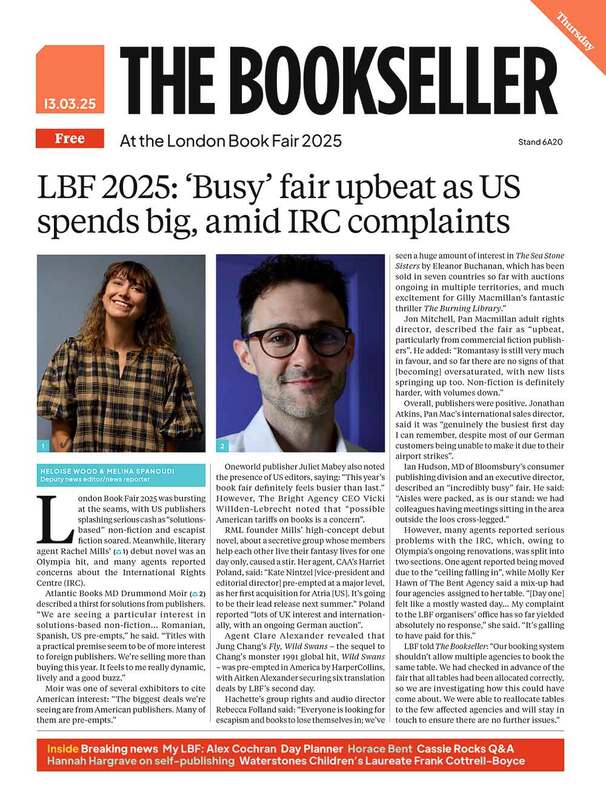You are viewing your 1 free article this month. Login to read more articles.
Headline 'proud' of American Dirt as debate heats up
Headline has reiterated it is "extremely proud" to be publishing American Dirt in the face of heated debate whether its story about Mexican migrants, by an American author who is not from the culture, is ethically and practically "problematic".
Jeanine Cummins’ third book American Dirt, which opens with brutal murder, is about a mother and her young son as they flee across Mexico to escape a drug cartel and their attempt to cross the US border.
Celeste Ng showed support for an article by author and translator David Schmidt that “pray[ed] the book doesn‚Äôt go down in history as ‘the great migrant novel'", calling its depictions of Mexico "laughably inaccurate". Ng wrote on Twitter the article made "a convincing case for why American Dirt is problematic‚Äìand backs it up with a lot of examples from the text itself". She added: "If you don‚Äôt know this culture (as I don‚Äôt), listen carefully to the people who do."
Publishing with Tinder Press in the UK and Flatiron Books in the US, it has garnered praise from the likes of Stephen King ("I loved it"), John Grisham ("a testament to the power of fear and hope") and Tracy Chevalier ("essential reading for our time"), among others, including Waterstones ("whip-smart pacing and an astounding ability to make the seemingly incredible both authentic and intimate").
It was announced as an Oprah Book Club Pick on Tuesday (21st January). Winfrey's selection was met with mixed reaction. "As a Mexican immigrant, who was undocumented, I can say with authority that this book is a harmful, stereotypical, damaging representation of our experiences," wrote Julissa Arce Raya, author of My (Underground) American Dream, on Twitter. "Please listen to us when we tell you, this book isn’t it."
Author Roxane Gay wrote on the platform: "It’s frustrating to see a book like this elevated by Oprah because it legitimizes and normalizes flawed and patronizing and wrong-minded thinking about the border and those who cross it."
As described by the Guardian, the backlash has been extensive, with some accusing the author not only of inaccuracies and stereotyping but of exploiting the suffering of Mexican immigrants. The author received a seven-figure advance from Flatiron Books after it won the book in a nine-way auction, and film rights have also sold.
A photo of a celebratory dinner held for the author by its US publisher Flatiron Books in May, in which it appears a barbed wire effect was used for the table’s floral arrangements, added fuel to the fire as images surfaced on social media.
In response to the critical reaction to American Dirt, Mary-Anne Harrington, publisher at Tinder Press, told The Bookseller: "We are extremely proud to be publishing American Dirt. We have had overwhelming support from the book trade and early readers alike."
British Commonwealth rights in the book were acquired in 2018 by Tinder Press from Caspian Dennis at Abner Stein in what was described as a "very competitive" auction. Intended to be its lead title in 2020, Headline announced a major marketing and publicity campaign earlier this month that includes major statement advertising at large commuter stations in London and other cities, a raft of interviews such as with BBC “Newsnight” and a visit from Cummins to the UK this autumn after her US tour.
In an author's note at the beginning of the book, Cummins wrote the disclaimer: "I was worried that, as a non-immigrant and non-Mexican, I had no business writing a book set almost entirely in Mexico, set entirely among immigrants. I wished someone slightly browner than me would write it."
She said further on The Guardian Books Podcast, when questioned whether she had the right to tell this story, that she had "resisted telling a story set in Mexico for quite some time" and she wrote two failed drafts of the book trying to focus on characters who were "more familiar" to her as an American. But, she said, "It wasn't working", adding she had wanted to convey that "any one of us in these times could become a migrant".
"I kept in frustration stopping and starting and at one stage I just realised I was trying to use an inappropriate lens to tell the story. The only people who mattered to the story in fact were Lydia and Luca and Soledad and Rebecca: the migrants," Cummins said on the podcast.
"Part of the reason that I wanted to tell this story was because I, like most people in the United States, come from a family of mixed heritage, of mixed background – some immigrants, some who have been in the US for a long time. My grandmother was from Puerto Rico, and she was a woman who came from a really wealthy family, was very well to do, posh and glamorous in Puerto Rico. And then she came to the US and she had a hard landing. She was suddenly Puerto Rican, you know ... and it had serious ramifications for her eight children, the oldest of whom was my father. And so I understood there was something really damaging about the way White Americans reduce immigrants in their mind, the stereotypes that we place on these people. Her new neighbours were so reductionist in their views of what she was supposed to be as a Puerto Rican. I understood, also, sort of in my DNA, this is what we are doing to migrants at our border right now, that we are painting them with the same brush, that we tend to think of them all as one thing, as this homogenous, rural, illiterate, poor, brown person, and in fact that is not what they are. They come from all different kinds of backgrounds, different countries, different languages, different socio-economic situations, different experiences with violence or the cartels or gangs in their home countries and they are all travelling for their own reasons. They're individuals. So that is a story I really wanted to explore."

















